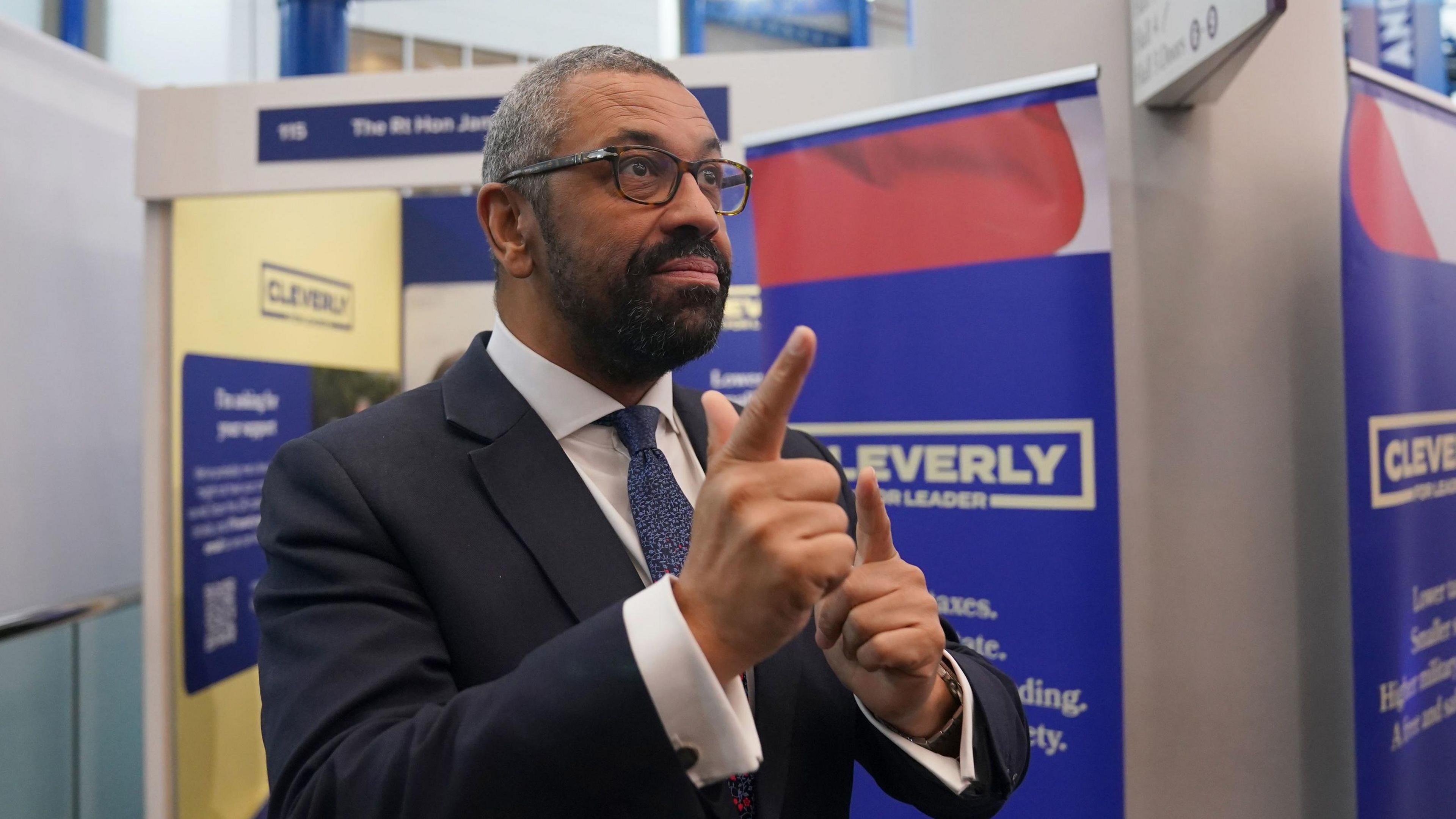'Stop the boats' slogan was error, says Cleverly

- Published
Rishi Sunak's “Stop the boats” slogan was an “error”, Conservative leadership contender James Cleverly has said.
The slogan, adopted in January 2023, referred to the then government’s efforts to curb the number of people trying to reach the UK by crossing the English Channel in small boats.
Cleverly, who later used the phrase numerous times when he was home secretary, told a fringe event at the Tory conference in Birmingham it “distilled a very, very complicated and challenging problem into a soundbite”.
When even one boat crossing could be deemed “a failure”, it was "an unachievable target”, he said.
"One of my frustrations was that we failed to communicate our successes in the Home Office portfolio and, unsurprisingly therefore, everyone believed we had succeeded in nothing."
Elsewhere, on the conference main stage, leadership rival Tom Tugendhat warned against the Conservatives turning into Reform UK as he made his pitch to party members.
Asked if he would do a deal with Nigel Farage, he said: "My job is to reform the Conservative Party, not to become Reform."
Rival candidate Kemi Badenoch said she was prepared to work with Farage's party in Parliament, but she ruled out an electoral pact.
Cleverly will get his chance to face questions from members on the main stage, alongside fellow contender Robert Jenrick, on Tuesday.
Conservative MPs will narrow the field to just two in further votes at Westminster on 9 and 10 October.
Party members will then choose between the final two, with a new leader due to be announced on 2 November.
The Conservatives suffered their worst result in a general election in July.
Tugendhat warns against Tories becoming Reform UK
- Published30 September 2024
I'd have done better than Sunak in election, says Truss
- Published30 September 2024
Tories must back ECHR exit to survive, says Jenrick
- Published1 October 2024
Conservative leadership: Who are the candidates?
- Published22 October 2024
A minister throughout the last parliament, Cleverly was highly critical of the Conservative government's response to the Covid pandemic, calling it the worst thing it did.
“Lockdowns were wrong, we got it badly, badly, badly wrong," he said.
The “whole world was scared”, but "we turned into all the things that I thought perhaps we could never become", he added.
Cleverly argued the UK went from being a “freedom-loving nation” to “snooping on our neighbours, dobbing in our friends and cancelling Christmas”.
"We deified certain experts” and epidemiological ones “became gods among gods”, while experts on domestic abuse, children’s mental health and the economy were “relegated” in importance, he added.
“Let’s never make that error again,” he said.
He put part of the blame for the Tories' election defeat on the tone of its message to the country, which he likened to “nails down a blackboard".
“We were harsh and shrill, and not nice”, he added, arguing that this resulted in many previous Conservative voters backing the Liberal Democrats or staying at home.
He also said his party needed to talk less and deliver more.
“Delivery will win us back voters from Reform. Tonal change will win us back voters from the Lib Dems and those who stayed at home."
Earlier, Cleverly told a different fringe event the party had to change not only its tone but also its behaviour to improve its appeal to younger people and women.
Years of infighting and "backstabbing" had alienated many in those sections of the electorate, he said.
'Freaking out'
The Conservatives needed to be more optimistic, engaging and positive about the future, rather than focusing on the past, to win the right to be listened to, he added.
The shadow home secretary observed that women were disproportionate users of public services - at the school gate, doctor's surgery or the police as victims of crime.
The Tories therefore needed to temper their desire for a "smaller, more effective state" by not "freaking out" women who relied on those services and winning back the public's trust that they would run them properly, he argued.
Cleverly also called the party to recruit more women and to make better use of its existing female members.
"We are too blokey as a party, and I say that as a bloke," he said.
He spoke of the level of abuse women in politics had to contend with, and said he realised that, despite the progress made, life in general was different and harder for girls.
"Men wear the same clothes every day, women don't have that luxury. If I put on weight, no one gives a monkeys.
"If women wear a different pair of glasses, some men will ask 'what are they trying to achieve by that?'"
At a fringe event on Monday evening, shadow minister for women and equalities Mims Davies warned the Conservatives were facing a "fundamental problem" recruiting young women to the party, and called for pride in being a Tory woman to be restored.
She said: "I think we've got an existential crisis when it comes to the women vote, I don't think women know what we stand for and how we support women.
"I look around this conference, there is no problem attracting young men to this party, there is a fundamental problem with attracting young women to this party."